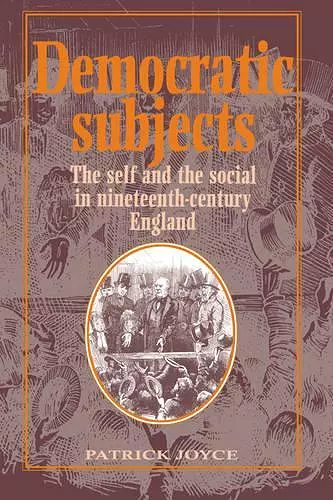Democratic Subjects
The Self and the Social in Nineteenth-Century England
Format:Paperback
Publisher:Cambridge University Press
Published:6th Oct '94
Currently unavailable, and unfortunately no date known when it will be back

A controversial study of class and social identity in nineteenth-century England.
This controversial and original study explores critically the nature of class identity by looking at the formation and influence of two men (Edwin Waugh and John Bright) who might be taken as representative of what 'working class' and 'middle class' meant in England in the nineteenth century.This pioneering and original study explores critically the nature of class identity by looking at the formation and influence of two men (Edwin Waugh and John Bright) who might be taken as representative of what 'working class' and 'middle class' meant in England in the nineteenth century. The two studies of individuals are complemented by a further study on narrative in pointing to the great importance of the collective subjects upon which democracy rested. The book indicates the way forward to a new history of democracy as an imagined entity. It represents a deepening of Patrick Joyce's engagement with 'post-modernist' theory, seeking the relevance of this theory for the writing of history, and in the process offering a critique of the conservatism of much academic history, particularly in Britain.
"Joyce's investigation of the lives, careers, and ideas of Waugh, Bright, and other "demotic" figures, as well as his more general analysis of the "democratic romances" expressed in melodramas, popular fiction, journalism, and other discursive forms, are detailed, thoroughly researched, and usually astute about the social contradictions informing "the democratic imaginary" of past and present." Nineteenth-Century Prose
"This is a skillfully constructed book, with the divergent but intertwined histories of Waugh and Bright, and the narratives which they created and sustained, now converging, now separating, but always illuminating the central argument....As a conventional intellectual biography, Joyce's study of Waugh is exemplary and highly illuminating; as an application of the ideas of the 'linguistic turn' to mid-Victorian politics, his study of Bright produces equally rich insights; and as an interdisciplinary discussion of the force of political and social narratives, the essay on democratic romances opens up vistas likely to be the focus of considerable future work both by Joyce and his students." Martin Hewitt, Victorian Review
"...an intriguing, at times dense, etymological critique of the nature of democracy and social identity...." R.A. Soloway, Choice
"...a confident presentation..." David Mayfield, Albion
ISBN: 9780521448024
Dimensions: 229mm x 152mm x 15mm
Weight: 376g
260 pages